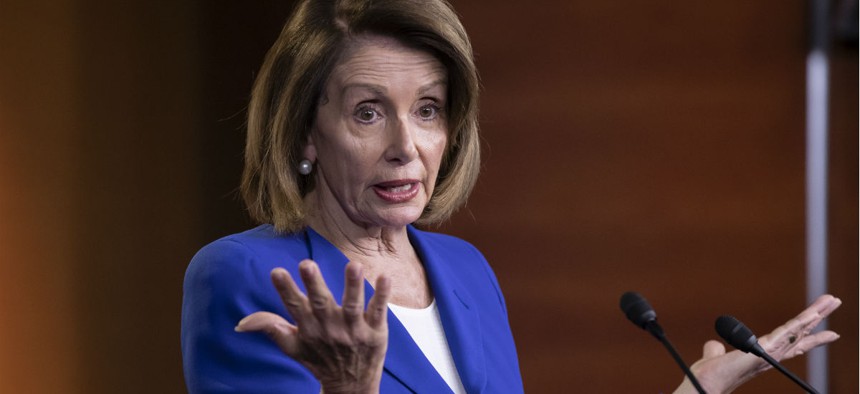Congress, White House Remain Sharply Divided Two Weeks From Another Shutdown
Trump suggests there could be another approach to avoiding another closing of agencies.
Lawmakers and the White House remain widely divided on key issues with just two weeks until another government shutdown, though President Trump this week expressed openness to an alternative path that would avoid yet again shuttering agencies.
The bipartisan, bicameral conference committee formed as part of the deal that reopened government met for the first time this week on an appropriations bill for the Homeland Security Department. That group has been tasked with negotiating a resolution to the standoff over border security, and Trump’s demand for funding for a wall along the U.S.-Mexico border, and its members have offered some overlapping ideas. They have not, however, agreed on the president’s signature issue.
“There’s not going to be any wall money in the legislation,” House Speaker Nancy Pelosi, D-Calif., said, adding that additional technology and ports of entry are “part of the negotiation.”
The current continuing resolution funding the agencies impacted by the shutdown is set to expire Feb. 15. Pelosi said the conference committee must approve of its compromise bill by Feb. 8 to give Congress enough time to get the bill to Trump’s desk before that deadline, though the president on Thursday suggested that type of legislation would be a non-starter.
“On Feb. 15th, the committee will come back, and if they don’t have a wall, I don’t even want to waste my time reading what they have because it's a waste of time,” Trump said. “Because the only thing that works for security and safety for our country is a wall.”
Sen. Richard Shelby, R-Ala., the vice chair of the conference committee, highlighted the differences that remain between the two sides at the group’s first public meeting.
“Thus far, all sides seem to agree that border security is important. That is a good start, but it cannot end there,” Shelby said. “Our Border Patrol professionals—those on the front lines—tell us that a comprehensive approach is necessary. An approach that includes technology, infrastructure, personnel and physical barriers. Smart technology is part of a comprehensive solution, but it is not the solution in and of itself.”
House Democrats on the panel put forward their own border security proposal, which included funding for 1,000 new customs officers, increased air and marine operations, technology improvements and other reforms, but not physical barriers. Pelosi expressed optimism the committee was “working in good spirit,” and expressed optimism another shutdown would not take place.
“I hope that any shutdown would be taken off the table as a reasonable approach to governance,” Pelosi said, noting the “terrible impact” that last lapse had on federal employees and their families.
The House has already passed a package of six spending bills that would fund all the agencies that have yet to receive full-year appropriations. That package largely mirrors the fiscal 2019 spending plans agreed to on a bipartisan basis in the last Congress. The Senate took up a similar package during the shutdown, but only after attaching immigration reforms supported by Trump and rejected by Democrats. Lawmakers have not yet announced their plan for funding non-DHS agencies. The departments of Transportation, Housing and Urban Development, State, Interior, Agriculture, Treasury, Commerce, Homeland Security and Justice, as well as the Environmental Protection Agency, NASA, Office of Personnel Management and other independent agencies, have yet to receive full-year appropriations.
Even if lawmakers cannot strike an agreement on border security, or if their negotiations yield a compromise that Trump will not sign, the president signaled there would be another way to avoid a shutdown. Asked on Friday if he would declare a national emergency to secure funding for a wall if Congress does not deliver it to him, the president said, “I think there’s a good chance we’ll have to do that.” He said he would address the matter further in his State of the Union address next week and highlighted the reinforced fencing and new structure construction that is already underway or funded.
On Thursday, Trump gave an ominous warning about what might happen at the end of the current CR.
“I think that by having the shutdown we have set the table,” he said. “We've set the stage for what is going to happen Feb. 15.”




